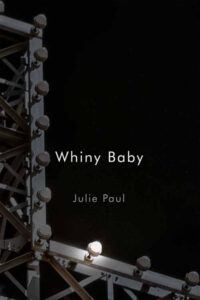By Kim Fahner
Whiny Baby
by Julie Paul
McGill-Queen’s University Press (2024)
With a title that evokes childhood spats and quarrels, Julie Paul’s second book of poems, Whiny Baby, gets at the things that bother us in life, but which people tend to avoid talking about. It’s a collection that speaks to loss, and grief, but also alludes to desire and longing. In the title poem, the speaker laments not feeling connected or ‘at home’ anywhere: “maybe my life’s pursuit is simply to feel comfortable/in the world itself, as a temporary resident/or visitor or caretaker, call it what you will./None of us will last this whole thing out.” Early in the book, then, Paul suggests that we will all feel unsettled at some point, but that it’s a personal choice as to how we choose to manage.
In “Here is Where?”, the sense of longing looms in lines like “It is the other me again, wanting—no big ask—a second/life alongside this one,” and in “Endemic,” the speaker yearns for the time before the pandemic and wonders “Will any of us/ever be the same? Do I want to know the answer?/The Before Times glow in my like head/like blue-footed boobies and lava gulls.” Paul then writes, firmly: “Those days were always endangered species–/I just didn’t want to admit it.” Sometimes, we only learn to value the best things in life—people, love, memories, or health, even—once they have disappeared.
While Paul deals with loss from death, as well as from drifting friendships, relationships, and marriages, she also speaks to the threat of misogyny in literary circles, including the loss of safety and innocence that women writers have had to deal with at public events. In one very powerful poem titled “AWP 2023 Event T 150: The Pocket Epic: Poets Writing at Length,” Paul documents the four-poet panel that dives “deep/into long form poetry as a way/to fully share their histories:/invisibility, negation, assault, torture.” The choice of poets on the panel reflects the idea of “taking up space/as female/genderqueer/deaf/and showing the work in long poems,/asking questions and giving enough space/to mull and meander to a possible answer.” A young man arrives late into the room where “less than 5 per cent are identifiable as male.” The poet’s head whirls, “Does he have a gun?/Does he know her?/Is he the brother in the poem?/Did her voice change/when he sat right in front of her/second row back?” Despite his possibly being an ally, his presence causes unrest in a group of women writers who know that “pain and violence/shared in the lines of a poem/can become weapons to fight future/pain and violence, or at least offer/a way to make us feel less alone.”
The poem that sits near the centre of the collection is “Greener Grass Mash-Up,” a long poem that conjures a tangential reflection on the story of Billy Goat Gruff. There’s a “personal suspension bridge” and a troll that lives underneath it. The troll quickly shapeshifts—moving from feisty toddler essence to the poet’s “own personal troll/(inner child/demon critic/whiny baby).” From there, Paul ventures into social media troll references, as well as to the notion that the bridge the troll guards could even be the bridge to retirement, the very one that some people cross and then find themselves not knowing what to do to make their lives bright. She leaves the reader wondering: “A poem is no RRSP/but how will I live if not by heaving words,/stacking syllables like bricks of peat.” There’s a concreteness about how Paul plants her metaphors in all her poems—offering her readers anchor points along the way, if you will, so that they can follow her lead—but this particular long poem is gorgeous in its content and form. It’s one to read more than once, one to ponder over and let marinate.
Some pandemic poems sit near the end of Whiny Baby, including pieces like “Telomere Repair, First Pandemic Spring,” and “Maybe It Was the Grass-Fed Butter.” Too, there are a couple of sonnets—one about a cat, and another about Easter Sunday on Hornby Island. In all her poems, though, Paul catches bits of light and encourages women to “become porous/become the rock at the base of the sacred mountain” or “the speller, the spell keeper, the giver for us,” so that women evolve rather than stay static in the face of unexpected challenges. In “Dear Poem,” as well, Paul asks the poem, “is there enough room/in this spacious moment/and fleeting life/to hold it all?” The answer to this rhetorical question is yes, and that yes is triumphantly echoed throughout all Whiny Baby’s poems. A reader can be a whiny baby, can grumble about life’s ups and downs, but they can also try to find the bits of light, or the poem, or small bit of beauty that might be a life preserver in difficult times.
Kim Fahner lives and writes in Sudbury, Ontario, Canada. She has published two chapbooks, You Must Imagine the Cold Here (Scrivener, 1997) and Fault Lines and Shatter Cones (Emergency Flash Mob Press, 2023), as well as five full books of poetry, including: braille on water (Penumbra Press, 2001), The Narcoleptic Madonna (Penumbra Press, 2012), Some Other Sky (Black Moss Press, 2017), These Wings (Pedlar Press, 2019), and Emptying the Ocean (Frontenac House, 2022). Her sixth poetry collection, The Pollination Field (Turnstone Press), will be published in Spring 2025. Learn more about her work at www.kimfahner.com.

